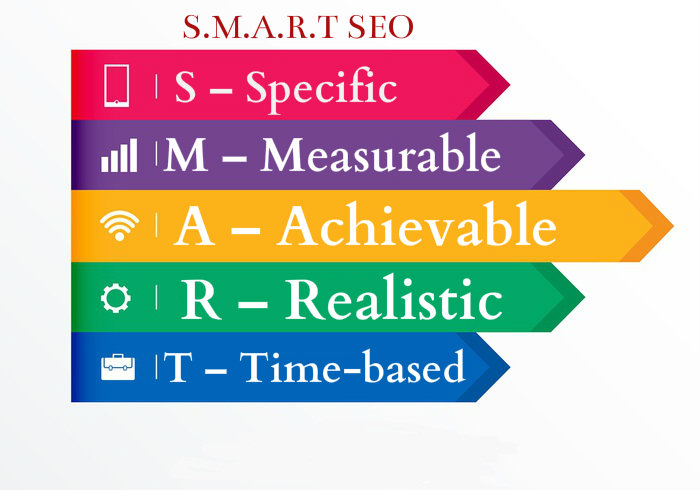How SMART SEO Works to Increase SERP Results?
How to set aggressive goals and make your business plans a success? SMART SEO is here to help you with your SERP results. It is never too late to apply the SMART SEO rules to your campaign and improvise.
2018 is the year of SMART SEO. In order to come up with a cost-effective SEO process with a higher return on investment, it is fundamental to set realistic and target-oriented goals, addressing the business needs. It is equally important to consider the site and market behavior, its characteristics, resources available, restrictions, and time. Unrealistic goals only lead to a non-effective SEO process that fails to yield results at the end of the day.
SMART is a solution to all these problems. It stands for:

Sometimes, an extended version of SMART called SMARTER is also used. Here it stands for:
E – Ethical
R – Recorded
These guidelines help us set goals and identify the best strategies to achieve them.
Defining SMART SEO & Its Role in SERPs
Specific
Specific objectives and goals are crucial to the success of a marketing campaign. It is imperative to understand what a conversion or goal means to your website, and how it is related to a broader business perspective. While we may like to think that of achieving #1 ranking for search terms relevant to the business, what we are aiming for is more exposure, greater visibility, more visits, more and more leads, and even more sales.
-
- The priority should be to address – What, Where, Who, Which and Why.
- What is your business goal?
- Where would you like to implement the SEO process?
- Who is your target audience?
- Which products or services are the most important for your business?
- Why would you like to start SEO process?
It is quintessential to make sure that the goals are connected to the business objective, clear in front of the eyes, and visible to everyone across all the departments in the hierarchy.
 Measurable
Measurable
Everything is measurable in digital marketing. However, by merely installing analytics, you cannot achieve your goal. It is imperative to be specific with respect to your SEO goals to ensure that the goals are measured. Only then, it would be possible to illustrate the improvement in the SEO metrics clearly correlating the SERP growth. For instance, a 60% increase in organic traffic should lead to 60 rises in total conversions from the organic traffic.
Therefore, the questions you might ask are:
- How to measure the achievement of SEO process goals? How long and how often?
- Which activities should you track?
- What are the key performance indicators? – incoming lines, conversions, non-branded organic visits
- What are the tools you want to use for tracking the progress of your business to achieve your goals? Google Webmaster tools, Google Analytics, Open Site Explorer, SEscout
- How to organize and automate the processes of data gathering and reporting
Achievable
It is good to set aggressive goals and aim high. However, do not set your goals too high so that you cannot attain them. Make your goals realistic and achievable by considering the following key areas:
- Feasibility: Choose keywords you can target. Do not go overboard.
- Scenario: Do you belong to the same league as the leading players ranking on the first page?
- Resources: Do you have adequate resources to meet your goals?
Developing these SMART goals is a computational process – what you want and what is achievable in the campaign with the resources available has to be considered.
Realistic
It is fundamental to set realistic goals, which is only possible when you have an in-depth understanding of search results for relevant and targeted search terms. If you are a local business and the results for keywords used are targeting a national business, you may not be able to rank in the top three pages. However, working on location specifics would ensure first-page visibility. The key is to have a well-thought and specific location page.
Now, to be realistic, you must ask the following:
- Is this doable?
- Do we have sufficient resources to work this out?
The class between Achievable vs. Realistic is the key here. An important distinction determines the short-term and long-term nature of SEO as a proven marketing strategy.
R also refers to relevant when SEO for SERPs are concerned. It is, thus, crucial to ensure that keywords and traffic targeted are relevant to the products and services you provide.
Time-based
Time is the key factor when setting your SEO goals. SEO often takes much longer than any other forms of digital marketing. While PPC delivers instant visibility and traffic, SEO does not. When you are planning, consider the time needed to implement your SEO strategies and other activities.
Although it is not always predictable, begin with a rough timeline estimate and monitor your progress.
The SMART approach is pivotal for the growth of SERPs as it allows you to perform a situation analyses, identify your digital marketing strengths and weaknesses, and improvise. Whatever is the issue, setting these SMART goals would allow you to identify lags and sharpen the SEO marketing tactics this year and beyond.

